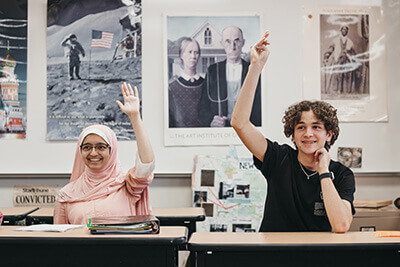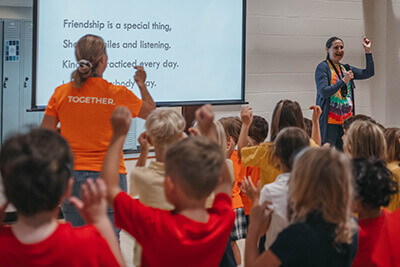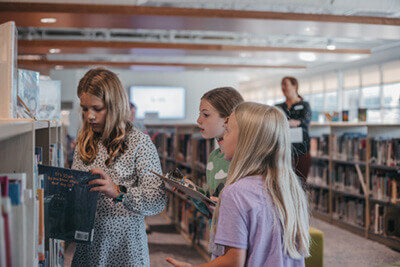September 5, 2024
 A liberal arts education is one of the many benefits of a private school. But looking deeper, the philosophy behind it reveals why a liberal arts education is so important in our technology-driven world. Education is more dynamic and multifaceted than ever, responding to the demands of a rapidly evolving global landscape. Amidst this transformation, the advantage of liberal arts education stands out as both timeless and increasingly relevant. Traditionally associated with studying subjects such as humanities, literature, philosophy, history, and the arts, liberal arts education emphasizes a broad-based approach to learning that fosters critical thinking, effective communication, and ethical reasoning.
A liberal arts education is one of the many benefits of a private school. But looking deeper, the philosophy behind it reveals why a liberal arts education is so important in our technology-driven world. Education is more dynamic and multifaceted than ever, responding to the demands of a rapidly evolving global landscape. Amidst this transformation, the advantage of liberal arts education stands out as both timeless and increasingly relevant. Traditionally associated with studying subjects such as humanities, literature, philosophy, history, and the arts, liberal arts education emphasizes a broad-based approach to learning that fosters critical thinking, effective communication, and ethical reasoning.
Who Benefits From Liberal Arts Education?
Students, schools, and society all benefit from liberal arts education. At every grade level, from kindergarten to middle to high school, liberal arts grow and prepare students to be global citizens. A balanced curriculum that coincides with a whole-child approach to teaching, rigor with purpose, character education, and differentiation results not only in a love for learning but in critical thinking, problem-solving, and communication skills that are valuable in every profession and field. Such a broad and deep content knowledge base will prepare students to adapt to various careers and future changes in the job market.
Private schools benefit from the kind of community that liberal arts education builds. At Mounds Park Academy, for example, we have a profoundly welcoming community built on shared values–many of which are directly rooted in liberal arts outputs, like communication, creativity, flexibility, and cultural awareness. A closely-knit private school community creates the best learning environment for all children. Here, we know and understand each child, and our teachers and students treat each other with kindness and respect.
 And in turn, society benefits because of the graduates and professionals who leave equipped with this kind of education experience. With a liberal arts education, graduates acquire a strong sense of social responsibility. They are setting out to measure success by their impact on the world. Liberal arts education fosters informed, engaged citizens with an ingrained comprehension of ethics, cultural understanding, and global perspectives. Understanding diverse viewpoints and ethical implications will help students navigate complex global issues and engage thoughtfully with others as the world becomes even more interconnected. Liberal arts graduates are also more likely to contribute to public discourse, understand complex societal issues, and participate actively in their communities. In Colorado State University’s article, “Addressing society’s ‘wicked problems’ requires the liberal arts,” Jeff Dodge writes, “There is growing recognition that persistent social challenges are intrinsically tied to human emotions and behavior, and can be effectively addressed only by incorporating the fields of study that make up the liberal arts into the discussion. In addition to inventing technical solutions, a comprehensive approach to wicked problems requires careful consideration of human routines, beliefs, and actions.”
And in turn, society benefits because of the graduates and professionals who leave equipped with this kind of education experience. With a liberal arts education, graduates acquire a strong sense of social responsibility. They are setting out to measure success by their impact on the world. Liberal arts education fosters informed, engaged citizens with an ingrained comprehension of ethics, cultural understanding, and global perspectives. Understanding diverse viewpoints and ethical implications will help students navigate complex global issues and engage thoughtfully with others as the world becomes even more interconnected. Liberal arts graduates are also more likely to contribute to public discourse, understand complex societal issues, and participate actively in their communities. In Colorado State University’s article, “Addressing society’s ‘wicked problems’ requires the liberal arts,” Jeff Dodge writes, “There is growing recognition that persistent social challenges are intrinsically tied to human emotions and behavior, and can be effectively addressed only by incorporating the fields of study that make up the liberal arts into the discussion. In addition to inventing technical solutions, a comprehensive approach to wicked problems requires careful consideration of human routines, beliefs, and actions.”
What Skills Do Liberal Arts Build?
Across the best private schools in Minnesota, effective written and verbal communication is a core component of liberal arts education, PreK-12. The ability to articulate ideas clearly and persuasively is essential in almost every professional field. Plus, it is an essential part of community-building through meaningful personal and societal interactions.
What effectively shapes learners is not only a curriculum that simply introduces public speaking, constructive feedback, and collaboration but one that continues to grow students’ confidence in these areas as well. At MPA, we see these skills bloom through the opportunities that exist outside of the classroom–a highly decorated speech and debate team, theatre and music performances at all grade levels, and extracurricular clubs that specialize in reading, music, art, and culture.
 “We live in an age where computers and technology can complete critical functions better, faster, and cheaper in all areas of life,” said MPA parent of alum and Dean of the Don Wright Faculty of Music at Western University, Dr. Michael Kim. “I believe that is by focusing on creativity, empathy, and the qualities that define our humanity; qualities, skills, and insights developed through the liberal arts and integrating the arts wherever possible in a cross-disciplinary way.”
“We live in an age where computers and technology can complete critical functions better, faster, and cheaper in all areas of life,” said MPA parent of alum and Dean of the Don Wright Faculty of Music at Western University, Dr. Michael Kim. “I believe that is by focusing on creativity, empathy, and the qualities that define our humanity; qualities, skills, and insights developed through the liberal arts and integrating the arts wherever possible in a cross-disciplinary way.”
These skills are crucial in a rapidly changing world where the ability to assess complex situations, question assumptions, and develop innovative solutions is highly valued. Though every school is not one-size-fits-all, MPA’s PreK-12 environment and commitment to innovation calls to empower students to live, learn, and thrive in the 21st-century globalized society. A broad knowledge of subjects stimulates creativity and encourages innovative thinking. The liberal arts promote exploring unconventional ideas and approaches, which can lead to novel solutions and advancements in various fields.
Do Liberal Arts Prepare Students For Careers?
By teaching incredible life lessons, liberal arts programs also prepare students for a wide array of careers and equip them to be highly satisfied and enjoy their jobs as well. The skills acquired–analytical reasoning, effective communication, and ethical judgment–are highly transferable and valued across many professions.
The Association of American Colleges and Universities has surveyed professionals in varying fields to find what skills are most relevant to workforce preparation and career longevity. Their “Fulfilling the American Dream: Liberal Education and the Future of Work” report found that “employers overwhelmingly endorse broad learning and cross-cutting skills as the best preparation for long-term career success. The college learning outcomes they rate as most important are oral communication, critical thinking, ethical judgment, working effectively in teams, written communication, and the real-world application of skills and knowledge.”
 In “Harvard Business Review,” Lynn Pasquerella, president of the Association of American Colleges and Universities, examines the essential skills learned through liberal arts curriculum further in her article “Yes, Employers Do Value Liberal Arts Degrees.” Her findings show that they provide students with confidence once they become professionals in their crafts in the “real world.”
In “Harvard Business Review,” Lynn Pasquerella, president of the Association of American Colleges and Universities, examines the essential skills learned through liberal arts curriculum further in her article “Yes, Employers Do Value Liberal Arts Degrees.” Her findings show that they provide students with confidence once they become professionals in their crafts in the “real world.”
“A liberal education for the 21st century mandates the acceleration of integrative, high-impact learning opportunities that engage every student in solving unscripted, real-world problems across all types of institutions, within the context of the workforce, not apart from it.”
Liberal arts education, a hallmark of MPA and many prep schools, sets an indispensable foundation for developing versatile and resilient minds. As education and society continue to evolve in order to meet the demands of a rapidly changing global landscape, the relevance of a liberal arts approach becomes increasingly apparent. By bridging gaps between disciplines and encouraging a deeper understanding of our shared and individual human experiences, liberal arts help students become informed, engaged, and innovative citizens.